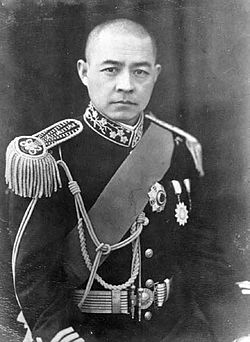|
Zhang Zizhong
 Zhang Zizhong (traditional Chinese: 張自忠; simplified Chinese: 张自忠; pinyin: Zhāng Zìzhōng; Wade–Giles: Chang Tzu-chung; August 11, 1891 – May 16, 1940) was a general of the Chinese National Revolutionary Army (NRA) during the Second Sino-Japanese War. Born in Linqing, Shandong, he was the highest-ranked officer and the only Army group commander of the NRA to die in the war. He was killed-in-action during the Battle of Yichang after refusing to retreat from the front lines. He showed great valor in the field and was regarded as one of the most valiant and respectable Chinese generals by the Imperial Japanese Army during the Second Sino-Japanese War. Because he was lieutenant general with the effective rank of full general at the time of his death, and was posthumously promoted to full general, he was also one of the highest-ranked Allied officers killed in action in World War II.[1] His mausoleum is situated in Beibei District, Chongqing. There are roads named after him in Shanghai, Beijing, Tianjin and Wuhan. Career timeline
DeathGeneral Zhang Zizhong, commander of the eight divisions that constituted the Chinese 33rd Army Group, was killed at approximately 4:00 p.m. on May 16, 1940, in fighting at Shilichangshan (‘Ten li mountain’) near Nanguadian in Northern Hubei. The battle was one engagement of the Zaoyang-Yichang campaign that rumbled through late spring of that year. Surrounded by the Japanese, his forces had refused either to retreat or to surrender. In the ensuing hand-to-hand combat, General Zhang had been wounded seven times in all, by grenade, bullet, and finally by bayonet. The victorious Japanese realized Zhang's identity only when a major discovered, in the left breast pocket of his blood-soaked yellow uniform, a fine gold pen engraved with his name. The major quickly summoned senior officers; they ordered a stretcher brought and the body was carried away from the battlefield. (This was observed, through half-opened eyes, by Zhang's long-time associate, the Chinese major Ma Xiaotang, who lay nearby, bleeding from a bayonet wound, and who later gasped out the story to Chinese as he died.)[3] See also
References
Further reading
External links
|
||||||||||||||||||||||||||
